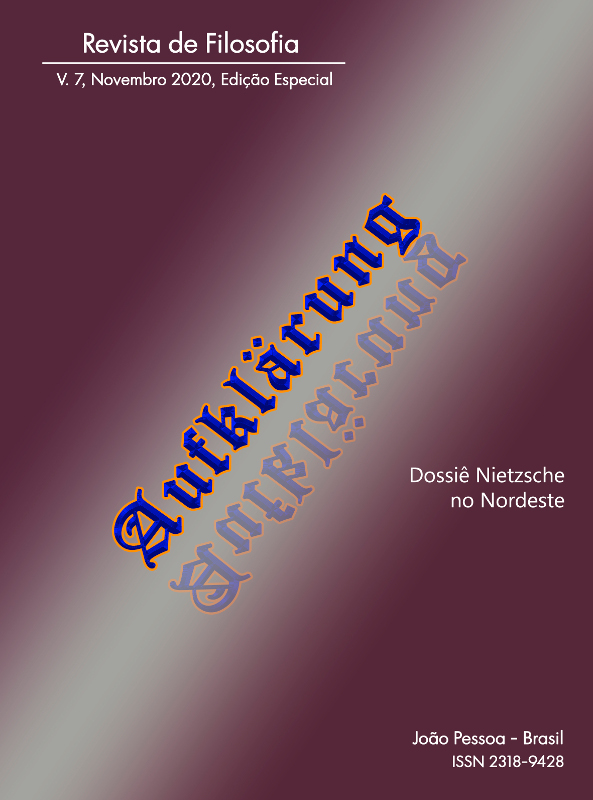Politics and the Drama of Existence in Leo Strauss' Nietzsche
DOI:
https://doi.org/10.18012/arf.v7iesp.56773Keywords:
Nietzsche, Leo Strauss, Will to power, Problem of equality, Critique of ModernityAbstract
Nietzsche's aversion to Christianity, democracy and socialism can be translated by his denial of egalitarianism. In fact, the philosopher sees in the feeling of secular hope and the loss of the agonistic aspect of existence, the most radical form of décadence. For his part, Leo Strauss sees in Nietzsche's attack on egalitarianism as a way of protecting modern liberal democracy from itself. However, for the Chicago professor, proposing a political regime from the Nietzschean conceptions would certainly not lead the world to another place, if not to barbarism. For Nietzsche exposes man to a brutish and inhuman truth, which most men can not bear. Thus, Strauss intends to use Nietzsche's lethal truths as a “toolbox”, his critique of modernity is fundamental to his overcoming nihilism and to the defense of the philosophical way of life, which implies acceptance of the drama of life as such how is she. That said, this study aims to show that: for Nietzsche the spread of the modern ideal of equality led the West to degenerate, by leveling all individuals underneath, transforming them into a herd, the birth of the last man was promoted, which makes it impossible the emergence of the creative genius that imposes its will to power, the Übermansch. Whereas, for Strauss, the Pathos for radical equality as the supreme value of modernity, besides having been the cause of the major catastrophes of contemporaneity, makes the emergence of the “gentleman” (virtuous man), and with it, the search for the best society, the best regime and the best way of living.
Downloads
References
ANSELL-PEARSON, K. An Introduction to Nietzsche as Political Thinker, Cambridge, University Press, 1994.
APPEL, F. Nietzsche contra Democracy, Ithaca, Cornell University Press, 1999.
BLOOM, A. “Leo Strauss: September 20, 1889 – October 18, 1973”. Political Theory v. 2, no. 4 (1974), pp. 372-392.
CONWAY, W. Nietzsche and the Political, Londres, Routledge, 1997.
DRURY, S. The Political Ideas of Leo Strauss. Updated Edition. Lexington: Palgrave
Macmillan, 2005 (1987)
LAMPERT, Laurence, Leo Strauss and Nietzsche, Chicago, Chicago University Press, 1996.
LAMPERT, Laurence, Nietzsche’s Task: an interpretation of Beyond the good and evil, New Heaven, Yale University Press, 2001.
MARTON, Scarlett, Nietzsche e a crítica da democracia. Dissertatio (33) inverno de 2011 pp. 17 - 31
NIETZSCHE, F. Além do Bem e do Mal: prelúdio a uma filosofia do futuro. 1ª ed. São Paulo: Companhia das Letras, 2005.
NIETZSCHE, F. O Anticristo: maldição ao cristianismo: ditirambos de Dionísio. 1ª ed. São Paulo: Companhia das Letras, 2016.
NIETZSCHE, F. Crepúsculo dos Ídolos: ou como se filosofa com o martelo. São Paulo: Companhia das Letras, 2006.
NIETZSCHE, F. A Vontade de Poder. Rio de Janeiro: Contraponto, 2008.
NIETZSCHE, F. Humano, Demasiado Humano. Tradução de Paulo César de Souza, São Paulo, Editora; Companhia das letras 2008
SHARPE, Matthew and TOWNSEND, Daniel, Introduction: the Strauss Controversy, Leo Strauss, and Nietzsche. Woodward, Ashley (org), Interpreting Nietzsche: reception and influence, New York, USA Continunn 2011, pp. 131 -148.
STRAUSS, L. An Introduction to Political Philosophy: Ten essays by Leo Strauss. [Ed. Hilail Gildin]. Detroit: Wayne State University Press, 1989.
STRAUSS. L. Correspondence of Karl Löwith and Leo Strauss, trans. George Elliot Tucker, Independent Journal of Philosophy 5/6, 1988.
STRAUSS, L. Direito Natural e História. São Paulo: Editora WMF Martins Fontes, 2014
STRAUSS, L. German Nihilism. Edited By David Janssens and Daniel Tanguay. Interpretation, Spring 1999, vol. 26, n° 3, pp. 353-378.
STRAUSS, L. On Tyranny. Chicago: The University of Chicago Press, 2000.
STRAUSS, L. Relativism. In. PANGLE, L. (Org.). Rebirth of Classical Political Rationalism. Chicago: The University of Chicago Press, 1989, pp. 13-26.
STRAUSS, L. Studies in Platonic political philosophy. With an Introduction by Thomas L. Pangle. The University of Chicago Press, Chicago, 1983.
STRAUSS, L. The City and Man. Chicago: The University of Chicago Press, 1992 (1964).
STRAUSS, L. The Re-education of Axis Countries Concerning the Jews, The Review of Politics 69 (2007), pp. 530-538.
STRAUSS, L. What Can We Learn From Political Theory? The Review of Politics 69, University of Notre Dame 2007, (1943), pp. 515-529.
STRAUSS, L. What is Political Philosophy? And Other Studies. Chicago: The University of Chicago Press, 1988 (1959).
STRAUSS, L.; VELKLEY, R. (Editor), Leo Strauss on Nietzsche’s Thus spoke Zarathustra / edited and with an introduction by Richard L. Velkley. The University of Chicago Press, 2017.
VIESENTEINER, Jorge Luiz. A Grande Política em Nietzsche. 1ª ed. São Paulo: Annablume, 2006.
Additional Files
Published
How to Cite
Issue
Section
License
Journal general policy
1.This journal works under a Creative Commons License aplied to online journals. That icence can be read in the following link: Creative Commons Attribution 4.0 International (CC BY 4.0).
2.Accordingly to this License, a)the journal declares that authors hold the copyright of their articles without restrictions, and they can archieve them as post-print elsewhere. b)the journal allow the author(s) to retain publishing rights without restrictions.
Metadata Policy for information describing items in the repository
1. Anyone may access the metadata free of charge at anytime.
2.The metadata may be re-used in any medium without prior permission, even commercial purposes provided the OAI Identifier or a link to the original metadata record are given, under the terms of a CC BY license refered for the Journal.







































